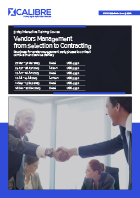| Date | Venue | Fee | |
|---|---|---|---|
| 23 Mar - 27 Mar 2026 | Dubai – UAE | $ 5,950 | Register Now |
| 20 Apr - 24 Apr 2026 | Lisbon - Portugal | $ 5,950 | Register Now |
| 08 Jun - 12 Jun 2026 | Dubai – UAE | $ 5,950 | Register Now |
| 06 Jul - 10 Jul 2026 | London - UK | $ 5,950 | Register Now |
| 07 Sep - 11 Sep 2026 | Dubai – UAE | $ 5,950 | Register Now |
| 14 Dec - 18 Dec 2026 | Dubai – UAE | $ 5,950 | Register Now |
About the Course
Vendor management involves strategic decisions, such as whether to make or to buy and, if buying, to determine sourcing requirements and timing. When considering suppliers, many large organizations now use a category management strategy to enable different categories of suppliers to get different amounts of sourcing attention. Such a strategy also enables conducting a supply base analysis to ensure that the number of suppliers in each category is correct, The Vendor management process is a subset of the sourcing process, but it is more detailed and involves individual supplier decisions. Much of this process is operational in nature. Discussions include developing supplier selection criteria, negotiations, and contracting. The process of managing purchase orders and following up on exceptions is also covered.
It is very essential for each organization to enhance and focus on their supplier relationship management as it is one of the main reasons for business continuity giving the proper attention to this area will take the business to different stages and success in different areas like saving, added value, avoid and mitigate risks even gaining opportunities as market understanding will be improved and a different perspective will be shared from outside the organization.
Core Objectives
The delegates will achieve the following objectives:
- The participants will understand and develop new techniques according to their business.
- The participants will be able to expand their look and gain a strategic view.
- The participants will be able to enhance and create the required skills for success in the field.
- The participants will be able to analyse things around them with a more critical eye.
- The Participants will have keys to enhance the current & future business objectives.
Training Approach
This training course is driven by a blended learning approach and draws on various adult learning techniques such as action learning, experiential exercises, group discussions, video case studies, and self-reflection activities but mainly in PPT presentation The resulting variety helps delegates stay engaged throughout the course, feel challenged and draw quick wins for their development. It also ensures delegates are exposed to ample opportunities to apply what they learn to the real-world challenges they face in the workplace.
The Attendees
Likewise, it will be valuable to the professionals but not limited to the following:
- Supply Chain Managers/Leaders
- Logistics Leaders/Managers
- Project Managers
- Supply Chain Leaders/Managers
- Procurement Leaders/Managers
- Transport Managers/Leaders
- Customs Managers/leaders
- Material Planners/Leaders/Managers
- Warehouse Managers/Leaders
Daily Discussion
DAY ONE: Sourcing
- What types of Sourcing are there?
- What are the steps in Sourcing?
- What is the difference between procurement & Sourcing?
- Sourcing strategy.
- Single Vs Sole Sourcing.
- What are sustainable Development goals?
DAY TWO: Procurement
- What is procurement strategy?
- Why do we need a procurement strategy?
- Procurement strategy challenges.
- Strategy development.
- Make or buy.
- 7 Rules of Negotiation.
DAY THREE: Supplier Relationship management
- What is supplier relationship management?
- The benefits of effective supplier relationship management.
- the benefits and challenges of supplier relationship management.
- Karljic Matrix
- Improving supplier relationship management.
- 5 tips for operation management success.
DAY FOUR: Contract Management
- What is Contract Management?
- How does contract management work?
- How to form a Contract management strategy.
- Contract management best practices.
- Contract management cycle.
- 5 steps managing risks in procurement.
DAY FIVE: Category management
- What is category Management?
- What are the principles of Category management?
- Category management strategy
- Benefits
- The difference with strategic sourcing.
- 10 ways to improve supplier relationship management.
Certificate Awarded
Upon successful completion of this training course, participants will be awarded a Certificate of Completion from XCalibre Training Centre, acknowledging their accomplishment. This certificate serves as a testament to their dedication to developing their skills and advancing their expertise in their respective fields.



